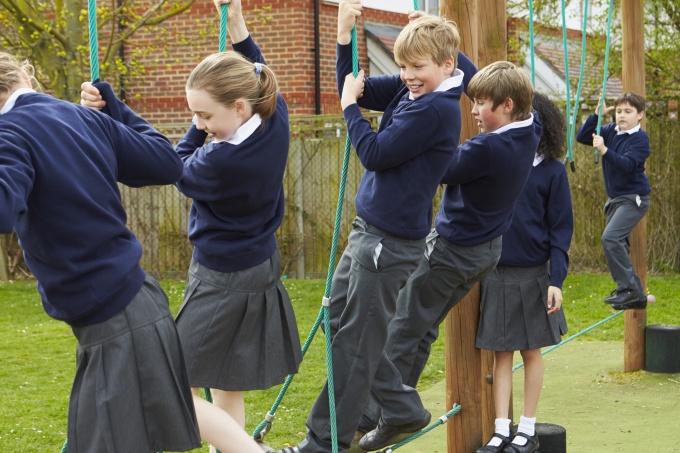The Need
King Henry VIII Preparatory School is an independent co-educational school for day pupils aged three to 11. There are 479 children on the roll and school activities are split between two nearby sites. Based in Coventry, pupils are from a mixture of backgrounds, though most come from financially-secure families. It has a higher than average proportion of Asian, and especially Chinese, pupils. Standards of behaviour and attendance at the school are high and it seeks to encourage and develop a range of talents among its pupils in addition to building strong home/school links and to creating an environment where pupils feel safe and secure. The Thrive Approach® was introduced to the setting in 2017 when the then headteacher was concerned that some pupils were feeling under pressure to achieve and suffering from low self-esteem as a result.
Thrive Licensed Practitioner Krista Gayton (pictured above), who had previously been working as a teaching assistant at a state school in Coventry, was recruited to lead on introducing Thrive to the prep school. “I think it’s a common misconception that private schools don’t need Thrive. Although we don’t have the behaviour issues that you might see in other schools what children desperately need here is self-esteem. They feel under a lot of pressure. There are a few children that it really gets to,” she said.
The Result
As a result of introducing the Thrive Approach, feedback from children has shown that it has made a real difference to their emotional health. In 2020, the school was shortlisted in the Wellbeing category of the TES Independent Schools Awards for its work with the Thrive Approach and other initiatives. It has also hosted a Thrive networking session to share its best practice with other schools in the area.
King Henry VIII’s journey with Thrive began with Mrs Gayton working with a small number of children who showed the greatest need. At the same time, she briefed staff about Thrive and the benefits of the Approach. With many staff members having been at the school for years, and some having even been pupils, there was some resistance to change and to the idea that pupils needed help with their emotional and social development. A senior Thrive trainer supported Mrs Gayton with this by coming into the school to deliver additional staff training.
Another early priority was to find a suitable location for a Thrive room on each of the school’s two sites, Swallows, for younger pupils aged three to six, and Hales, for pupils aged seven to 11. She found a room for younger children first before securing a room for the older children to use. Both were equipped with a facility to play calming music as well as a sitting area with a thick carpet, cushions, toys, books and displays with tips on how children can self-regulate. Each has a chill out area with bean bags for children to sit and just be as well as sensory items like plants, a lava lamp and Himalayan rock salt.
As part of the school’s mission to embed the Approach, in 2019 for the first time, whole classes and year groups were screened using the Thrive-Online assessment tool which was used to generate action plans for each child, including strategies to help teaching staff to meet their emotional needs. The school now has four Licenced Practitioners who spend time with different classes every week. These sessions begin by giving pupils an idea of what the Thrive Approach is about and the neuroscience that underpins it. Later sessions focus on ideas for emotional self-regulation. This method has two benefits – firstly, children learn about their own emotional processes and gain ideas on how they can manage difficult situations without dysregulating. And, by having the teacher remain in the classroom, they can see first-hand what a difference the Thrive Approach can make to children and appreciate their need for support, even though they may be reaching, or even surpassing, attainment standards.
"There have been children who have broken down in tears - not because anything bad has happened to them – but because they are really thinking about their emotions, possibly for the first time. All of the LPs have had children cry in these sessions and, as a result, we’ve had children coming forward for more Thrive,” she said. “Some of the staff have been incredibly affected by it, too. Taking Thrive into their classrooms has completely changed their mindset."
Thrive has also been an additional marketing feature for the school at the school’s open days, when prospective pupils and their parents visit the school, said Mrs Gayton. “As an independent school we are obviously in competition with other settings. I know we are the only private school in this area that has Thrive and it’s something I’m keen to let parents know about at open days. I have had parents come into the Thrive room who are amazed when I show them the social and emotional activities that we offer here. There are parents that would sign up to the school purely because of Thrive,” she added.
As an independent school, staff are expected to prove the benefits of everything they do so that parents are confident that they are getting value for money. As such, Mrs Gayton has captured feedback from children that Thrive is working for them as well as using reports from Thrive-Online to show how much more children are engaged with learning after their Thrive sessions. To demonstrate, Mrs Gayton cites several anecdotal examples. One is of a boy in year four who came from a farming family in a rural community who felt very different to his peers as a result. He had begun to come into school acting out in anger – something which isn’t tolerated at Henry’s. Mrs Gayton started to work with the child using the Approach and, over time, he changed his outlook and behaviour completely to the point where he was recommending Thrive to his peers. “The fact that someone was listening to him made a huge difference to that child,” said Mrs Gayton.
Another example she cites concerns a pupil who joined Henry’s from a state school who felt a huge amount of pressure to succeed and suffered from low self-esteem as a result. There was no issue with his behaviour or his attainment, but the boy showed no emotions and started Thrive sessions to work on this. “When we started working together there wasn’t one good thing about himself that he could think of and if I pointed something out he didn’t believe me. I worked with him for two years and the change in him is amazing. Everyone comments on how different he is. He used to walk with his head down and now he stops by the Thrive room to say ‘hi’ and he shows empathy and emotion,” she added.
Henry’s has also run well-attended workshops for parents about the Approach to help them adopt some of the principals at home so that pupils benefit from a consistent, joined up approach to emotional well-being.
Over to you
Reduced anxiety and behavioural incidents. Calmer classrooms filled with engaged leaners. Improved relationships with parents and carers. These are just some of the outcomes reported by settings embedding Thrive’s whole-school approach to mental health and wellbeing. Are you ready to join them? Click here to get started.
Pass it on
Small actions can lead to a big ripple effect. If you enjoyed this post or found it helpful, please consider supporting us in our mission to help every child and young person feel safe, supported and ready to learn by sharing it using the social media buttons below.
Want to join a like-minded community of senior leaders and classroom staff benefitting from insights and strategies to improve attendance, behaviour and attainment? Add your email address below. (It’s easy to unsubscribe).

_680.jpg)

(7)_680.jpg)
_680.jpg)
